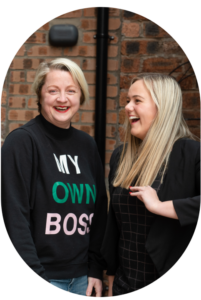At the start of this month, I sat in a witness box for the first time in my career.
Not writing a report from a safe distance like I used to do years ago at KPMG.
Actually there.
In court.
About to be cross-examined as an expert witness.
The case?
It started back in April 2019.
Over six years of supporting my client through a business partnership that went spectacularly wrong, dealing with debt collectors, watching the stress pile up alongside the legal fees.
And finally, finally, we were in front of a sheriff to sort it out.
My client was just 25 when she signed the lease with a business partner over 10 years her senior.
They were excited about working for themselves, having complete control over the food they’d serve, the team they’d build, the reputation and relationships they’d foster within a small friendly neighbourhood and community.
But they never had the conversations that could have protected them both.
The opposing solicitor stood up.
I knew exactly what he was doing. Trying to rattle me, make me doubt my own work, get me to agree with his version of events that conveniently ignored all our evidence.
You know that thing some men do when they think you’re out of your depth? That special condescending tone?
Yeah. That.
He tried to out-count me.
I’m from Northern Ireland and now based here in Glasgow. The “o” in “counted” is silent, if you know what I mean.
Reader, I double-counted him.
I sat there with my hand under my chin, one eyebrow raised (apparently – my client told me afterwards), just staring at him like, “Come on then, mediocre man, come on.”
That PMT energy, you know? I could feel it building and thought, “Better rein this in a bit.”
But I wasn’t having any of his nonsense.

He submitted a schedule that morning with no totals on it. I’d done my homework on it anyway – went through it, worked out what was missing.
When he started questioning me about figures, I pointed out there were no totals. The sheriff asked if it was my schedule.
“No,” I said.
Our side found where it was actually located in the evidence pack we’d submitted eight weeks earlier, as you’re supposed to do.
Then he tried this whole thing about whether my client had paid certain debts. “Have you got evidence she paid this?” he asked, trying to catch me out.
“There’s a sheet here,” I said calmly. Our side found it in the evidence pack and showed the sheriff exactly where to look. “Most of it’s HMRC, and I had access to HMRC. So I can personally vouch that she paid it because I could see it.”
After that, he sat down.
The sheriff was complimentary to my client (who was representing herself, by the way, using ChatGPT to help with the legal stuff).
He was complimentary to me – openly impressed with my credentials, experience, and conduct. And he said he expected better from the lawyer.
He went with my figure from August 2020 – the low-bar figure my client was willing to accept all along.
Six years.
Tens of thousands of pounds in legal fees.
Stress, sleepless nights, businesses folding.
My client’s now a student at 34 – not where she thought she’d be at this age – debating whether to just make herself bankrupt because she doesn’t have the money anymore.
All of this could have been avoided.
Here’s what I really want to talk about.
I should never have spent time with this client in a courtroom. We should have talked six years earlier, when she and her business partner were still excited about their venture, before the money got messy, before the resentments built up.
Because here’s a truth that keeps me up at night: Most of the financial disasters I see could have been prevented with three uncomfortable conversations at the start.
I know, I know.
When you’re starting a business with someone – a friend, a colleague, someone you trust – the last thing you want to do is sit down and talk about what happens when it all goes wrong.
It feels negative. Like you’re jinxing it. Like you don’t trust them.
But you know what feels worse? A courtroom. Six years of legal fees. A friendship destroyed. Businesses folded. Bankruptcy on the horizon.
Being brave isn’t standing up to an aggressive solicitor in court. It’s having the difficult conversation before you need to.
The three conversations that could have saved my client

If you’re thinking about going into business with someone – whether it’s a formal partnership, a limited company with multiple directors, or just “we’re doing this together” – you need to have these conversations.
Preferably with an accountant present (hello, that’s me) to help you think through the implications.
1. What happens if one of you wants out?
Not if. When. People’s circumstances change. Health issues arise. Family situations shift. Someone gets an amazing job offer that means they can’t give the business the time anymore.
- How do you value their share?
- Who gets to buy them out?
- What’s the timeline?
- What happens to client relationships?
Have this conversation now, when you still like each other. Not six years from now in a courtroom.
2. What happens if you fundamentally disagree?
You will. At some point, you’ll want to take the business in completely different directions. One wants to expand, the other wants to consolidate. One’s comfortable with debt, the other is risk-averse.
- How do you make decisions?
- Who has the final say?
- What happens if the disagreement is so big you can’t work together anymore?
My client’s case? They didn’t have this sorted. They just… stopped agreeing. And then stopped talking. And then started talking through solicitors.
3.What happens with the money?
This is my area, and this is where things get messy fast if you don’t have clarity:
- How much does each person get paid, and when?
- Who can spend money without asking the other person?
- What happens to profits? Reinvested? Distributed? When?
- What if one person is working more than the other?
- Personal expenses vs business expenses – who decides?
- How do you handle tax obligations?
These aren’t theoretical. These are the exact questions that ended up being argued about in that courtroom.
The opposing side came up with a massive figure for what was owed. My client said “I’ve always said I’d pay what’s fair, but not that.” They couldn’t agree because they’d never properly agreed on the basics in the first place.
Getting ‘a cheaper, kind of more relaxed accountant’ at the beginning – or no clear accounting systems at all – cost them tens of thousands in the end.
Being brave enough to say the hard things
Standing in that witness box, doing my raised eyebrow thing at a condescending solicitor – that felt brave, sure. But actually?
It’s braver to say: “I know we’re excited, but let’s talk about what happens if this doesn’t work out.”
It’s braver to admit: “I’m not sure I trust myself to make six-figure decisions alone – let’s put some checks in place.”
It’s braver to ask: “What if our friendship doesn’t survive this business?”
These conversations feel awkward.
They feel like you’re being negative or untrusting.
But they’re actually the opposite.
You’re being realistic, protective of your relationship, and sensible about your future.
And you know what?
If you can’t have these conversations with your potential business partner, that’s probably a sign you shouldn’t be going into business with them.
What this means for you
Whether you’re:
- Thinking about going into business with someone
- Already in a partnership that’s getting complicated
- A sole trader wondering if you should bring someone else in
- Dealing with a business relationship that’s starting to feel strained
Talk to someone. Talk to me. Have the difficult conversations.
Yes, getting proper advice costs money upfront.
But I promise you, it costs a LOT less than sorting it out in court six years later. My client can tell you that.
And if you’re already in trouble – if conversations are getting heated, if you’re not sure how to untangle things, if you’re worried it’s heading somewhere messy – get help now. Not when it becomes a legal battle.
Here’s what I can do
 I work with businesses at every stage – from “we’re just thinking about this” to “oh god, everything’s a mess.”
I work with businesses at every stage – from “we’re just thinking about this” to “oh god, everything’s a mess.”
I can:
- Help you have those difficult initial conversations (I’m good at making awkward stuff less awkward)
- Set up structures and systems that protect everyone
- Help when disagreements start (before they become court cases)
- Untangle complicated financial situations
- And yes, be the expert witness if it does end up in court (but let’s really try to avoid that, eh?)
I understand it’s not just about the numbers.
It’s about the people, the emotions, the relationships, the fear of having hard conversations.
And sometimes, it’s about sitting in a courtroom with one eyebrow raised, refusing to let someone intimidate you into agreeing with nonsense.
But I’d much rather meet you before that point.
A word from my client

After the case was settled, my client reflected on her experience:
“I cannot stress this enough – I wish I’d have met Gillian at Fearless Financials before I embarked on this journey. This scale of fallout would have been totally avoidable and honestly it should just not have happened in the first place.
I am so proud of Gillian. The Sheriff was incredibly impressed with her experience, credentials and conduct and I know that if she wasn’t there to defend her work then it may well have been a worse outcome at court.
We got the best case scenario – a true sum owed with no expenses. I knew I was never going to win completely – I never questioned that I may owe my ex-partner some money to make our drawings from the partnership even, but it’s certainly the best loss I could have got.
My story is an extreme example of when things go wrong – it’s unlikely it’ll happen to many other people. My advice would be, if you do it [start a business] with anyone else, make sure you’re both great at communicating and have a crystal-clear agreement, disciplinary procedure, and exit strategy in place.”
Your next step
If any of this has made you think “oh god, I need to have these conversations” or “we’re already past that point and I don’t know what to do” – let’s talk.
Give me a call. Send me an email. I’m here.
Let’s have the conversation now, while you still like your business partner.
While there’s still time to set things up properly.
While we can still prevent the courtroom scenario.
Because honestly, you really don’t want to be the next case that takes six years and ends with someone considering bankruptcy.
Be you. Be brave. Build a better business.
Starting with the difficult conversations.

